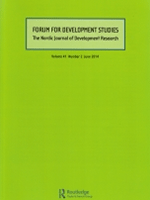Author
Karina Standal and Tanja Winther
Abstract
Electricity provides a range of desirable services such as the electric light and the use of mobile phones and is regarded as a conditional factor for economic growth. Gender equality and women's empowerment are also promoted as a key to development on the international agenda. However, relatively little is known about how the advent of electricity in new contexts affects gender relations. The present analysis of electricity's impact on gender relations engages with the concepts of care work and empowerment. Based on two ethnographic case studies in rural communities in Uttar Pradesh, India, and Bamiyan, Afghanistan, we examine how and to what extent the introduction of electricity affected women's care work practices and empowerment – and potentially transformed gender relations. We also draw on our own empirical material from other parts of India (West Bengal and Jharkhand). We find that electricity affected everyday life in terms of providing important resources and enhancing women's opportunities to perform their expected role as care workers more efficiently and in a qualitatively better way. The women appreciated this positive effect of electricity in their everyday lives. However, we argue that in India, electricity at the same time reinforced structures of gender inequality such as patriarchy and dowry practices, and we trace this tendency to the conceptualisation of women as care workers in combination with conventional, gender ‘neutral’ electricity interventions. In contrast, there are signs that women's status increased in the Afghanistan case, which we link to the unusual inclusion of women engineers in the electricity supply.
